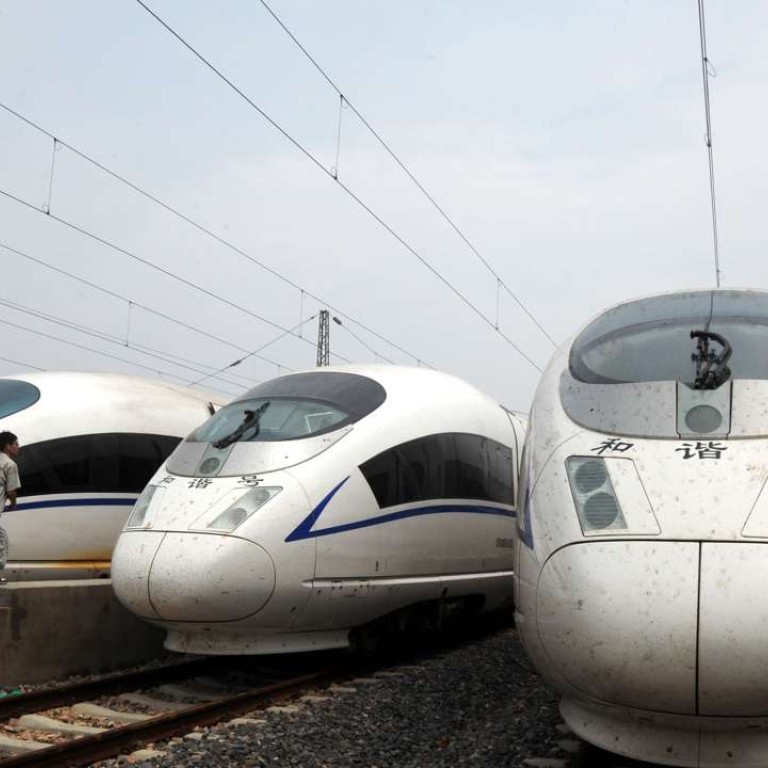
China Railway Materials hits bond brake as company sputters in slowing economy
State-owned China Railway Materials, the nation’s largest railway materials distributor and one of its largest steel products traders, has joined a growing list of Chinese companies struggling with debt obligations as the economy sputters.
The Beijing-based company has requested a trading suspension on its bonds to give it time for restructuring them in view of its financial difficulties amid the commodities bust. It is believed to be the first company directly owned by the central government to do so.
“In recent years, China Railway Materials’ business scale has shrunk continuously while profitability has fallen,” it said in a filing on the website of China Foreign Exchange Trade System that operates the interbank fund-raising market.
“To protect investors’ interests, the company ... has applied to suspend trading of relevant debt instruments in the morning of April 11, trading will resume after relevant matters are ascertained and disclosed to investors.”
The company, formerly the materials administration bureau of the Ministry of Railway before its incorporation in 1987, has nine outstanding bond instruments with a total of 16.8 billion yuan (HK$20.2 billion) owed to investors. The maturity terms range from 180 days to five years, and are repayable between May 17 this year and February 18, 2019.
More than a dozen corporate bonds have defaulted in recent months amid a protracted economic slowdown, sending shock waves through China’s 14 trillion yuan bond market.
China Railway Materials’ net profit in the first three quarters of last year plunged 79 per cent year on year to 37.83 million yuan as revenue tumbled 44.6 per cent to 34.74 billion yuan. It recorded an operating loss of 52.43 million yuan for the period, compared with a profit of 69.56 million yuan in the year-earlier period.
It was able to book a net profit for the period thanks to 100.95 million yuan of gains from what it called the “treatment of illiquid assets”, possibly asset disposals, and 15.29 million yuan of government subsidies.
Finance cost net of finance income fell 53.6 per cent year-on-year in the nine months, but was still at a hefty 457.2 million yuan as it was sitting on 21.9 billion yuan of loans and bond debt net of cash at the end of September, 277 per cent its shareholders’ equity.
China’s railway fixed-asset investment last year grew only 2 per cent to 823.8 billion yuan, the slowest in three years and a marked slowdown from the 21 per cent in 2014, according to a Daiwa Capital Markets research report. Daiwa forecasts it to slow further to 1 per cent both this year and next year and shrink 1 per cent in 2018.
China’s steel consumption fell 5.4 per cent last year to just under 700 million tonnes after dropping 3.4 per cent in 2014. It is expected to fall a further 3 per cent this year, according to China Iron & Steel Association.
China Railway Materials procures and distributes materials used in railways construction, operations and maintenance, including diesel, rail car parts, cement. It also leases large construction and maintenance equipment.
It is one of China’s largest steel products traders, with 26 million tonnes of annual volume in 2011.It also trades coal and iron ore as well as chromium and manganese, found in steel alloys. In addition, it is the second largest shareholder of once London-listed African Minerals, which has an iron ore mining project in Sierra Leone in western Africa.
African Minerals fell under bankruptcy administration just over a year ago after failing to repay its lender and partner Shandong Iron and Steel Group, which took over its subsidiaries operating the project.
The plight of China Railway Materials, which has substantial exposure to the upstream materials production and procurement business that has been hit hard in China’s economic slowdown, contrasts the health of its railway construction customers.
“The China railway constructors reported positive 2015 results, with a strong rebound in new contracts and improved operating cash flow due to China’s credit loosening,” said analysts at Daiwa Capital Markets.
They projected “high-single-digit to low-teen” percentage earnings growth with rising profit margins for the railway builders this year, adding “the magnitude of railway construction could surprise the market in an otherwise slowing environment” even if they do not expect any major economic stimulus.
Beijing plans to invest 3.5 trillion to 3.8 trillion yuan in the five years to 2020 to add 30,000 kilometres of new lines so that the operational mileage reaches 150,000km, including 30,000km of high-speed rail.

